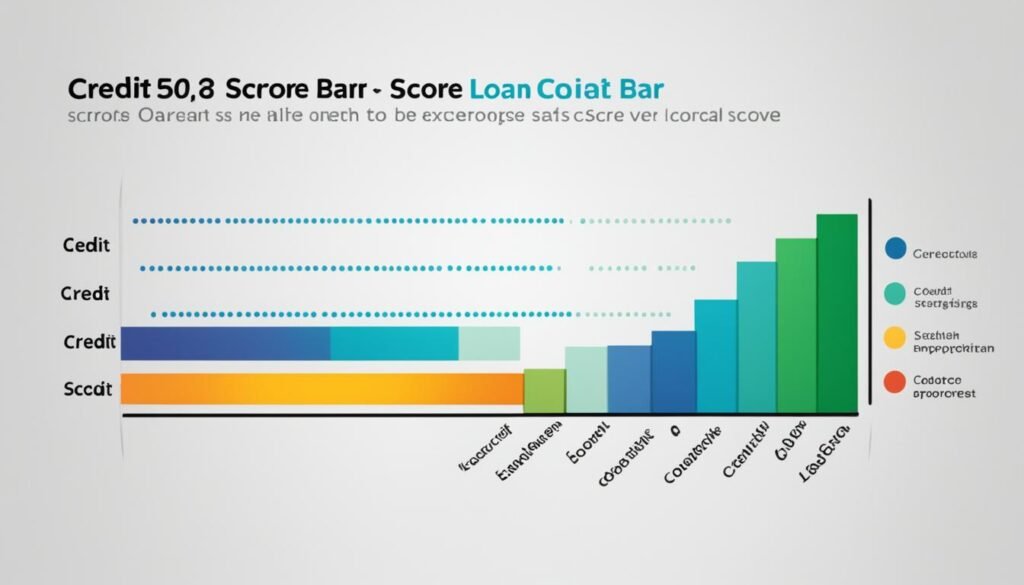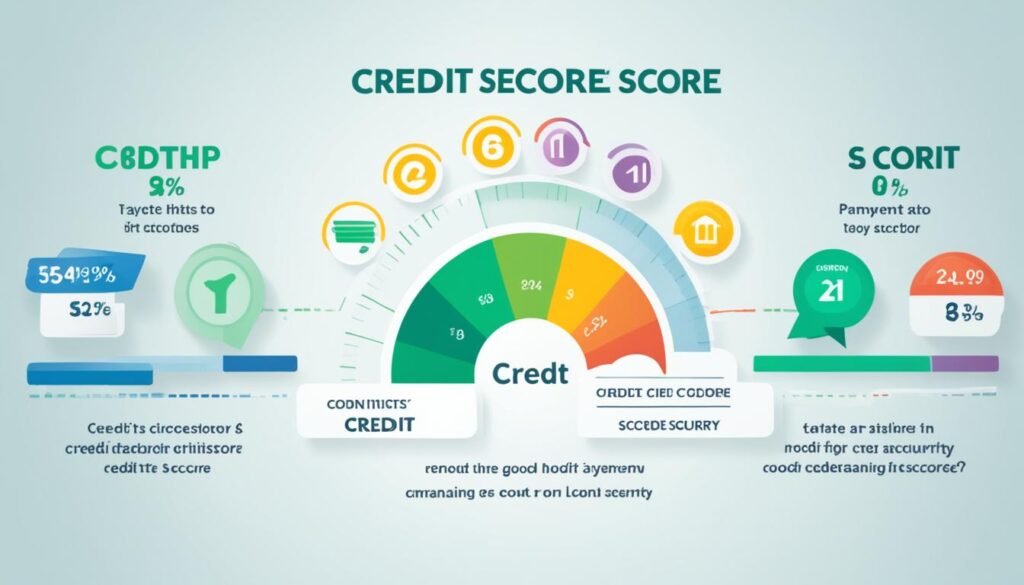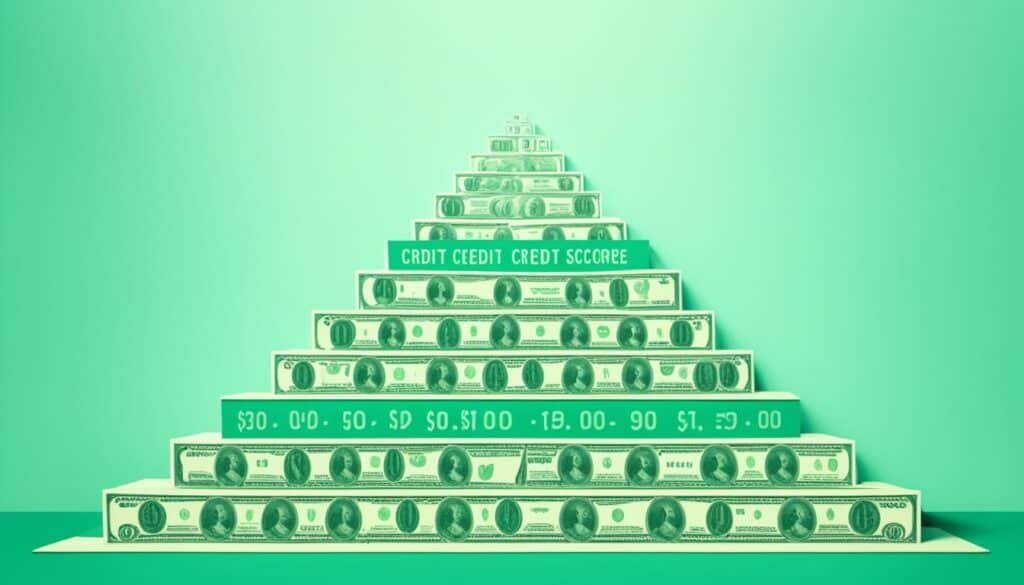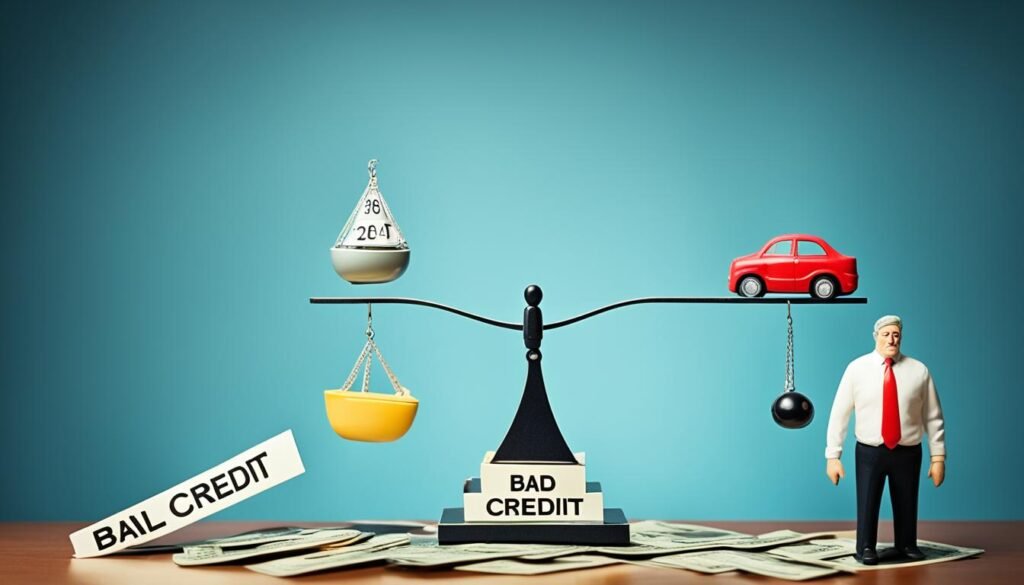Loan Security: Your credit score is vital for loan security. It’s a number from 300 to 850. This number quickly shows lenders how risky it might be to lend money to you. They use your credit score to guess if you’ll pay back what you owe on time.
If your credit score is high, lenders see you as less of a risk. You might get lower interest rates on loans. You could also find it easier to get a loan. But if your score is low, expect higher interest rates and tougher rules. Sometimes, you might not get a loan at all.
Key Takeaways: Loan Security
- Your credit score is a key factor in loan security and creditworthiness.
- Lenders use your credit score to evaluate the risk of lending to you.
- A higher credit score can lead to more favorable loan terms, while a lower score may result in higher interest rates or loan denials.
- Understanding the factors that influence your credit score can help you improve your creditworthiness and secure better loan terms.
- Monitoring your credit report and addressing any errors or issues can positively impact your credit score over time.
Understanding Credit Scores and Creditworthiness
Your credit score is crucial when looking for loans or credit. It shows lenders how well you manage credit. Scores range from 300 to 850. The higher your score, the better loan terms you might get.
What Is a Credit Score?
A credit score is like a snapshot of your money story and ability to handle credit. It looks at your payment history, current debts, types of credit, credit age, credit use, recent credit checks, and debt-to-income ratio. All these paint a picture of how well you handle credit.
The Importance of Creditworthiness
When deciding to lend you money, lenders check your creditworthiness. This means they check if you’re likely to pay back on time. Your credit score matters a lot in this decision. They also review your credit report. This report shows how you’ve managed your credit in the past.
Knowing and managing your credit score well can open doors for better loan terms. This includes lower interest rates and easy repayment plans. This is possible by showing you’re creditworthy. It boosts your chance of getting approved and gives you more financial opportunities.
“Your credit score is a key factor in determining the interest rate and terms you’ll receive on a loan. The higher your score, the better the deal you’re likely to get.”
Credit Score Ranges and Their Impact

Your credit score plays a big role when you apply for a loan. It’s a number that shows how likely you are to repay the money. On the FICO® scoring model, scores go from 300 to 850. A higher score means you’re lower risk. This can affect the interest rates and terms on loans and other financial products you’re offered.
The FICO® Score ranges from highest to lowest are:
- Exceptional (800 to 850) – These borrowers get the best deals because they are seen as low risk.
- Very Good (740 to 799) – Those with very good scores are also in a good place, getting competitive rates and terms.
- Good (670 to 739) – They are still seen as creditworthy. But they might not get the best deals available.
- Fair (580 to 669) – It could be harder for these borrowers to get loans. Or they might get higher rates.
- Poor (300 to 579) – Those with poor scores are often considered risky. They might struggle to get credit or face high rates.
Lenders look at your score and set interest rates based on the risk you pose. If you have a lower credit score, you might face higher rates to cover that risk. But if you have a higher FICO score, you could get better terms. Knowing your credit score level is key if you’re looking for a loan. It helps you understand the interest rates and terms you might get from lenders. This knowledge is essential when preparing to apply for financing.
How Your Credit Score Influences Interest Rates
Your credit score matters a lot. Lenders look at it to decide your loan’s interest rate. Knowing how your interest rate changes with your credit score is key to smart financial choices. This knowledge can save you lots of money over time.
Why Low Credit Scores Lead to Higher Interest Rates
People with low credit scores are seen as riskier. They might have missed payments or defaulted before. Lenders might ask them to pay more in interest. This is to cover the risk of not getting paid back. It’s called risk-based pricing.
Why High Credit Scores Result in Lower Interest Rates
Conversely, those with high credit scores are less risky. They have a history of managing credit well. This includes paying on time and keeping debts modest. Lenders trust these borrowers to pay back as promised. So, they offer them lower interest rates.
| Credit Score Range | Average Interest Rate |
|---|---|
| 800-850 | 4.25% |
| 700-799 | 5.50% |
| 600-699 | 7.75% |
| 500-599 | 10.25% |
The table clearly shows the link between credit score and interest rates: the better your credit score, the lower your interest rate is likely to be.
“Your credit score plays a big part in what interest rate you’re offered. Knowing how it works can lead to smarter money choices.”
Loan Security and Credit Scores
Your credit score matters a lot to lenders. It shows how risky it might be to loan you money. The higher your score, the less risky you seem. This means lenders feel more secure about lending to you. If your score is low, lenders might not offer you a loan. Or, if they do, the terms may not be so good.
A higher credit score shows you’re good at managing money. Lenders see you as less risky. So, you might get better loan terms. But, a low score makes lenders worry more. They might ask for bigger down payments or say no to your loan. To get the best loan terms, keeping a good credit score is important. Understand how your credit score affects loan safety. Then, work on making it better to get the most secure loans.
“Your credit score is the single most important factor in determining the loan security and terms you’ll receive from a lender.”
The Cost of Poor Credit Over Time
Your credit score matters a lot in personal finance. It affects how much you pay to borrow money, like for a mortgage. Having a low credit score will make your mortgage payments and total costs much higher over time.
Mortgage Costs and Credit Scores
Here’s an example to show how bad credit can cost you. Say you’re getting a $200,000 30-year mortgage. With a low credit score, you might pay $184 more each month. That’s $66,343 more during the life of the loan than someone with great credit.
| Credit Score Range | Monthly Payment | Total Interest Paid |
|---|---|---|
| 760-850 (Excellent) | $1,013 | $164,680 |
| 700-759 (Good) | $1,067 | $184,120 |
| 640-699 (Fair) | $1,133 | $207,880 |
| 580-639 (Poor) | $1,197 | $231,023 |
This extra cost affects your ability to save or invest. It shows how bad credit can make money decisions harder. It directly impacts your mortgage, affecting your financial security too. Keeping a good credit score is key for getting better loan deals. It lessens the financial hit of borrowing. Knowing how your credit affects your loans helps you make smart financial moves.
Components of a Credit Score

Your credit score shows how trustworthy you are with money. It’s made up of several important pieces. Knowing these parts can help you boost and keep a good credit score.
Payment History
How you’ve paid back debts is key, making up 35% of your score. Things like your credit card and loan payments matter. Paying on time shows you’re reliable and lifts your score.
Credit Utilization
This talks about how much credit you use, and it’s 30% of your score. It’s smart to use less than 30% of what’s available to you. This helps keep your score high.
Length of Credit History
Average credit account age is what this looks at, making up 15%. The older your accounts (and the better you’ve used them), the better for your score.
Credit Mix
Different types of credit show you can handle money in various ways. It’s 10% of your score. Having a mix signals your credit skills and can raise your score.
New Credit Inquiries
Getting checked out by creditors now and then is fine. But too many checks can hurt, making up 10% of your score.
Knowing what boosts your credit score is key. It helps you improve the right areas. This can lead to more loan and financing options for you.
| Credit Score Component | Percentage of Credit Score |
|---|---|
| Payment History | 35% |
| Credit Utilization | 30% |
| Length of Credit History | 15% |
| Credit Mix | 10% |
| New Credit Inquiries | 10% |
“Understanding the key components that make up your credit score is crucial for maintaining and improving your creditworthiness, which in turn can directly impact your loan security and overall financial well-being.”
Improving Your Credit Score for Better Loan Security

To get better loan terms, focus on credit score improvement. Use good credit management to show you’re a reliable borrower. This is key for your finances.
Looking over your credit report often is smart. Find and fix mistakes. Doing this can raise your credit score.
- Always pay your bills on time. This is the biggest part of your credit score. So, never miss a due date.
- Don’t use too much of your available credit. Try to keep it under 30%. That shows you handle credit well.
- Don’t close old accounts unnecessarily. Even if you don’t use them, they help your credit history and score.
- Getting added to someone else’s credit card can also boost your score. Choose someone you trust for this.
Following these tips can help you build better credit. Lenders pay attention to this, offering you better deals and more security. It’s a process, but it’s valuable.
“Improving your credit score is a journey, but the benefits of responsible credit management are well worth the effort.”
Stick to good credit building strategies. A healthy credit profile will give you more options and save money in the future.
The Consequences of Bad Credit

Having a poor credit score can cause many problems. You might not get good credit cards. You could also face high interest rates on loans. Plus, your insurance costs more. It’s harder to rent a place, and getting a job may be tough. People like lenders, landlords, and bosses see bad credit as a sign that you’re not good with money. This makes it hard to get credit, a home, or a job.
Limited Credit Options and Higher Interest Rates
With bad credit, getting a credit card or a loan is tough. Lenders worry about lending to those with low scores. They think these people might not pay back the money. So, you might only get high-interest loans or credit cards. This can make it hard to keep your finances in check and to improve your credit score.
Challenges in Securing Employment and Housing
A bad credit score can also hurt job and housing searches. Employers and landlords often check credit. They might not hire you or let you rent if your credit is bad. This can cause you to miss out on jobs and have trouble finding a home. It adds to the challenges faced by those with bad credit.
“A bad credit score can have far-reaching consequences, impacting your credit, housing, and job opportunities. Taking steps to boost your credit is key to avoiding these problems.”
Bad credit’s effects are serious and can last a long time. So, it’s crucial to keep a good credit score. By learning how bad credit can harm you and taking steps to improve, you can better your chances for financial options, jobs, and housing.
Experian Boost: Get Credit for Other Payments

When trying to improve your credit score, we often miss the impact of daily payments. Experian Boost changes that. It lets you include utility, phone, rent, and streaming service payments in your credit report, helping you build better credit. When you join Experian Boost, you link your accounts. Then, you can pick payments to highlight on your Experian credit report. This new way uses your alternative credit data to show you’re good with money, potentially raising your credit score quickly.
The idea of Experian Boost is straightforward. Any payment you make daily can help your credit score. Experian says users see an average 13-point jump in their credit scores with this tool. This could help with better loan offers, lower interest rates, or just to prove you’re reliable to lenders.
If you don’t have much credit history, Experian Boost is a great chance to show off your good money choices. It’s a bold move that can really boost your overall Credit score and set you up for financial wins.
“Experian Boost has been a game-changer for me. I was able to increase my credit score by 40 points simply by connecting my utility and streaming service payments. It’s amazing how these everyday payments can make such a difference.”
– John Doe, Experian Boost User
In today’s credit world, tools like Experian Boost are game-changers. They allow you to use different credit data, showing you’re good at managing money. This not only boosts your credit but also opens up better financing options for you.
Also Read: How Do Interest Rate Impact Savings Accounts?
Conclusion
Your credit score is crucial for many reasons. It affects whether you get loans and the terms you get. By understanding how important your credit score is and working to make it better, you can get better loan offers and improve your overall financial health. To get loans approved and lower interest rates, you need a good credit score. Building and keeping a good credit score helps you access credit easily.
It also means borrowing money costs less, which is great for your finances over time. The importance of your credit score, loan approvals, and financial health are all tied together. By focusing on your credit score, you open doors to better financial choices. This leads to a more stable and successful financial future.
FAQs
What is a credit score?
It’s a three-digit number showing how risky it is to lend money to someone. It reflects your trustworthiness when you apply for credit.
Why is creditworthiness important?
Your creditworthiness predicts if you’ll pay back a loan on time. This affects if you get a loan and the interest you pay.
What are the different credit score ranges?
Scores go from 300 to 850. They include: Exceptional (800-850), Very Good (740-799), Good (670-739), Fair (580-669), and Poor (300-579).
How do credit scores affect interest rates?
Lower scores mean higher interest rates. Higher scores get lower rates. It’s about protecting the lender’s money.
How does a credit score impact loan security?
Higher scores mean you’re less risky to lend to. You’ll get better loan terms. But with low scores, you might face loan denial or worse terms.
What is the long-term cost of having a poor credit score?
Bad credit makes loans more expensive over time. It can add up to thousands in extra interest payments.
What factors make up a credit score?
Your payment record, debts you owe, credit history length, kinds of credit you use, and new credit checks are key.
How can I improve my credit score?
Check for and fix errors in your credit report. Pay your bills on time. Keep your credit card balances low. Don’t close accounts you don’t need.
What are the consequences of having a bad credit score?
A low score makes it hard to get credit, gets you higher rates and premiums, affects your housing options, and can even hurt job chances.
What is Experian Boost, and how can it help improve my credit score?
Experian Boost lets you link and get credit for paying utilities, phones, rents, and streaming services. It boosts your Experian credit report with positive payments.
Source Links
- https://www.finra.org/investors/personal-finance/how-your-credit-score-impacts-your-financial-future
- https://www.bankrate.com/credit-cards/bad-credit/the-high-cost-of-a-low-credit-score/
- https://www.experian.com/blogs/ask-experian/why-do-people-with-higher-credit-scores-get-lower-interest-rates/
